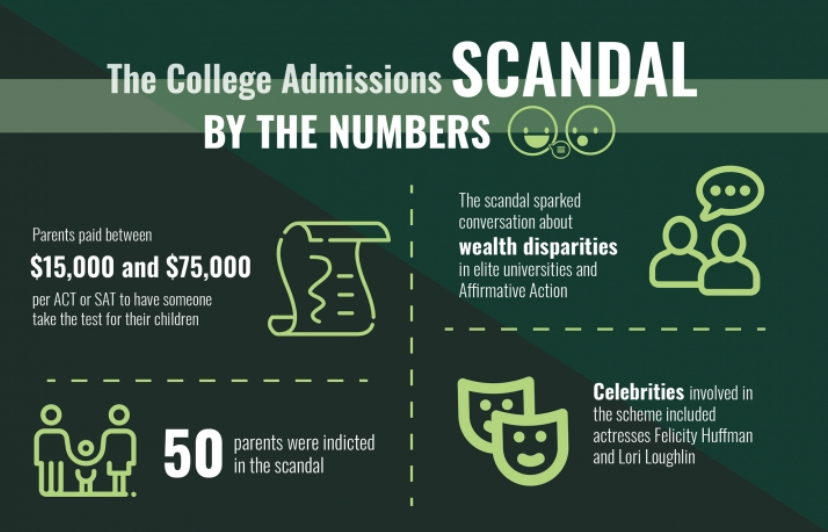Robert Igbokwe On March 12, the FBI publicly announced the uncovering of Operation Varsity Blues, a multimillion-dollar conspiracy coordinated by some of the U.S’s most notable names to influence college admissions decisions at several of the U.S.’s most prestigious research universities. The discovery upset students and parents across the nation, igniting a conversation about the fairness of college admissions and post-grad opportunities in America. The scandal has attracted nationwide attention for many reasons—perhaps the most obvious being the fact that the people implicated are celebrities like Lori Loughlin, her daughter Olivia Jade, and Felicity Huffman. Latin College Counselor, Ms. Pleshette said, “I think one of the things that makes [the admissions scandal] so interesting is that we have a bit of an obsession with celebrity culture. We like seeing people who live high, be brought down.” Some, including Junior Lulu Ruggiero, felt that the focus on the stars involved in the issue distracted from the real issues the exposé revealed. Ruggiero said, “Cheating into college has been a method for some for so long now, but has been silently accepted by most people. The media finally brought this long-standing problem to the general public, then sugar coated it by focusing on the celebrities.” For many Latin students, wealthy parents using their money to give their children access to unearned opportunities was far from a new revelation. Senior Jenny Nuñez said, “The college admissions process is already so unfair that this isn’t surprising—but that isn’t an excuse to justify what happened. I was upset when I heard about this—despite subconsciously knowing—because there are so many minorities at universities who feel like imposters while there are people who buy themselves into these colleges.” Senior Nick Duarte agreed, saying, “I think the entire scandal once again exposed the methods people use to try to uphold their privilege. It continues a cycle of ‘success’ by virtue of being wealthy. But there still isn’t enough focus on dismantling this system.” But to dismantle this system, it’s first necessary to understand what it is, and why it exists. The case is often cited as an extreme example of parents willing to do anything to set their children up for success. But why does success seem to translate to attending a competitive university? Ms. Pleshette says, “People are constantly fearful and anxious that there is a scarcity of opportunity, which is not true. Many are convinced that the only way to a successful career is attending these glorified universities.” Only about 5% of students are enrolled in colleges with an acceptance rate below 25%. However, it’s irrational to believe that this 5% can fill up every job opportunity in the country. That is not to say that attending a prestigious university will not come with some advantages in the job market—and there are plenty of reasons one would want to attend such universities beyond job opportunities. But recent research suggests that after the first job/internship position, the benefits of one’s undergraduate university begin to wane and success (at least financial success) is dependent on the student’s individual performance in this position. Regardless, many parents and students are concerned and angry about how the scandal may affect their admissions chances. “Opportunity is not like pie: it doesn’t run out. It may not be equally distributed, but it doesn’t run out. And there is always far more than one path to get to your definition of success.” Operation Varsity Blues have posed difficult questions about not only the fairness of college admissions, but also of the entirety of the U.S.’s acclaimed meritocratic system. How can the U.S.’s educational system make sure that students know that it’s possible to succeed without going to a highly-ranked university? How can the U.S. improve its private universities to make sure that everyone has a fair chance of success? And how can Americans dismantle the complex systems that keep the wealthy invariably in power and inhibit the mobility of the poor? Sources Brookings | Putting the College Admissions Scandal in Context]]>






































zmcarthur • Apr 20, 2019 at 7:59 am
Fascinating article, Robert. You’re almost as good at writing as you are at factoring. I’m interested in Jenny’s quote: “I was upset when I heard about this—despite subconsciously knowing—because there are so many minorities at universities who feel like imposters while there are people who buy themselves into these colleges.” Jenny, are you saying that the kids whose parents have bought their way in are truly imposters, and it’s sad minorities feel that way too?
The whole college admissions system is wildly problematic; so many colleges are very similar but market themselves as incredibly unique experiences. Talk to your teachers; college is pretty great anywhere, try not to stress about exactly where you end up. You can, and will, thrive at college if you bring curiosity and effort, whether that’s at MIT or at Wyoming.
lcampbel • Apr 16, 2019 at 9:57 am
Awesome work, Robert. This is an awesome investigative-journalism piece — if you want to hear more about the scandal, The Daily did a great feature on it in March! You can listen to it on Spotify. Great use of stats and concrete data to back up your piece!